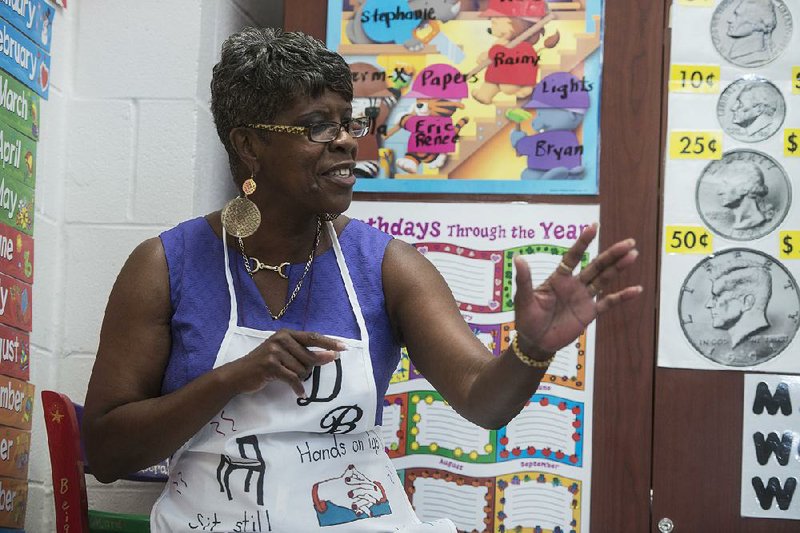Ten years after Hurricane Katrina flooded New Orleans and displaced more than 400,000 people, some of those who fled have made new lives for themselves in Arkansas.
Katrina was a Category 3 hurricane when it hit Louisiana's coast on Aug. 29, 2005, causing levee breaches that flooded New Orleans, killed hundreds, and destroyed homes and businesses. Hundreds of thousands of people fled the city and other coastal areas with few or none of their belongings.
Bernice and Don Evans weren't sure where they would end up when they left New Orleans on the day after the hurricane made landfall.
The night the storm hit, they were at their respective jobs. As levees broke and the city flooded, they made their way to their third-floor apartment in the Seventh Ward. Water rose to the second floor of the building.
Bernice Evans and her two daughters, who were 16 and 18 at the time, evacuated on a rescue boat that was picking up women and children, she said. Don Evans and his stepson were evacuated later.
The Evanses lost track of one another until they were reunited at the Arkansas Baptist Assembly Campground in Siloam Springs about a month later, the couple said.
Don Evans, his brother and Don's stepson witnessed the destruction of the submerged New Orleans as they waited to be evacuated. People died, gunshots rang out and a building exploded, Don Evans recalled. He said he saw volunteers arriving in boats and trucks full of food and supplies, who were turned away by officials who said it wasn't safe for them to be there.
One truck driver was arrested when he protested, Don Evans said.
"In other words, we didn't have no help at all. Period," he said. "It was almost like they wanted us to die. That's what it felt like."
After waiting six to seven hours, he, his brother and his stepson had left their flooded building and boarded a bus.
"[We] sat on the floor," he said. "They crammed us in like sardines. Nobody knew where we were going."
They first landed in Lafayette, La., where they stayed in the convention center until mid-September. As Hurricane Rita approached the Gulf of Mexico, they were moved to Houston. Rita made landfall on Sept. 24 between Sabine Pass, Texas, and Holly Beach, La.
The Evans men later were put on another bus, this one headed to Arkansas.
Meanwhile, Bernice Evans and her daughters were initially put on a bus to Houston. Later they were taken to Fort Chaffee near Fort Smith. Their stay there was short before moving farther north to Siloam Springs.
The bus carrying Don Evans arrived at Fort Chaffee the day after a bus carrying Bernice Evans left there. The two were reunited in late September when Don Evans also reached Siloam Springs.
Another New Orleans native, Deborah Bradford, recalled the chain of events that took her to Northwest Arkansas.
She had lived in New Orleans for 48 years. When she was 8 years old, she rode out Hurricane Betsy in her grandparents' attic in 1965. The house flooded, and she learned a lesson.
"After Betsy, we never took that chance anymore, because we were up there for like a week, and we had the Red Cross come and feed us," she said.
So, the day before Hurricane Katrina made landfall, Bradford fled north to Magee, Miss.
Katrina knocked out electricity in Magee, so Bradford and about a half-dozen family members hit the road, this time heading for Fayetteville, where Bradford's brother lived.
Their reception was warm, she recalled. Arkansans organized a gathering where people signed up to donate house furnishings. People helped her find a place to live.
Bradford now owns, and lives in, the house her sister lived in for the first two years after Katrina.
The Evanses and Bradford returned to New Orleans in the fall of 2005 to see what was left of their homes and lives there, but the devastation sent them all back to Arkansas.
The Evanses stayed at the Baptist camp until they found permanent housing. They were among many hurricane survivors at the camp who were at a crossroads, Don Evans said.
Many chose to go back to New Orleans.
"For me, our city didn't want us back," he said. He might go back to visit now but not to live, he said. "I felt like I was kicked out."
Bernice Evans said she's been happy living in Siloam Springs, which is a fraction of the size of New Orleans. Don Evans said that for him the smaller-city life has had its ups and downs. He said it feels to him like Mayberry from The Andy Griffith Show.
"It feels like home to me," Bernice Evans said. "The only thing is that it's just boring."
As for Bradford, it took her a couple of years to warm up to Arkansas. She now lives in Fayetteville and is starting her 10th year teaching at Harp Elementary School in Springdale.
"If you had asked me 10 years ago whether or not I would ever live in Fayetteville, Ark., I would have said absolutely not," she said.
She longed to go back to New Orleans for the first two years after she relocated to Fayetteville.
"Then God spoke to my spirit and said, 'You are home. You're doing exactly what it is that I would have for you to do,'" she said.
Bradford said her faith grew as she relied on God to rebuild her life. That faith got her through several more "storms," including a divorce and the deaths of four family members over 10 years.
Much of Bradford's family has since returned to New Orleans. She tries to visit at least once a year, but for her, Fayetteville is home now.
"I'm not leaving Arkansas until God, who directed me here, directs me away from here," she said.
Metro on 08/30/2015
